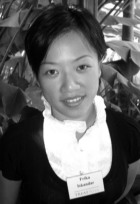ACATA Members Speak Out—Treatment Advocates Address UN General Assembly, International AIDS Conference
October 2006—Two members of the Asian Community for AIDS Treatment and Advocacy (ACATA)— Mony Pen of Cambodia and Frika Chia Iskander of Indonesia—spoke recently before major international AIDS conferences about their experiences as HIV-positive women and as advocates.

In her keynote address at the International AIDS Conference, Frika Chia Iskander urged greater involvement of people living with HIV/AIDS. (Photo: Dredge Kang)
|
Pen, who works with the Khmer HIV/AIDS NGO Alliance in Cambodia, spoke about the struggle to overcome stigma and discrimination in an address before the United Nations General Assembly Special Session on HIV/AIDS (UNGASS) in New York Cityon 2 June. Acknowledging the progress Cambodia has made in combating the epidemic, she noted, “At the same time, the success has not been enough to ensure that people living with HIV/AIDS can stay alive and live with dignity.”
“In most places,” Pen said, “our voices are not valued but rather controlled….Speaking from my experience in Cambodia, stigma and discrimination will never be overcome if we people living with and affected by HIV/AIDS are not at the forefront of the response.” Pen also thanked the Collaborative Fund Project and ACATA for supporting the involvement of people with HIV/AIDS (PWAs).
Iskander spoke at the opening session at the XVI International AIDS Conference in Toronto on 13 August. Representing the community of people living with HIV/AIDS, she joined at the podium such figures as Bill and Melinda Gates, Peter Piot, executive director of UNAIDS, and Helene Gayle, outgoing president of the International AIDS Society.
Iskander, an advisor to APN+ (Asia Pacific Network of People Living With HIV/AIDS), described the challenges confronting advocates and PWAs in Asia and around the world. “When it’s time to deliver, there is no time to waste,” she declared. “What does this mean to the community? It means that we are beyond words, beyond talk, beyond commitment. It is time for the real thing.”
Calling for the introduction of affordable second- and third-line drug regimens and questioning why children with AIDS are forced to take adult medications, Iskander encouraged funders and governments to recognize that the involvement of PWAs is central to the fight against HIV/AIDS. “We are part of the solution,” she said, “not just a target group.”